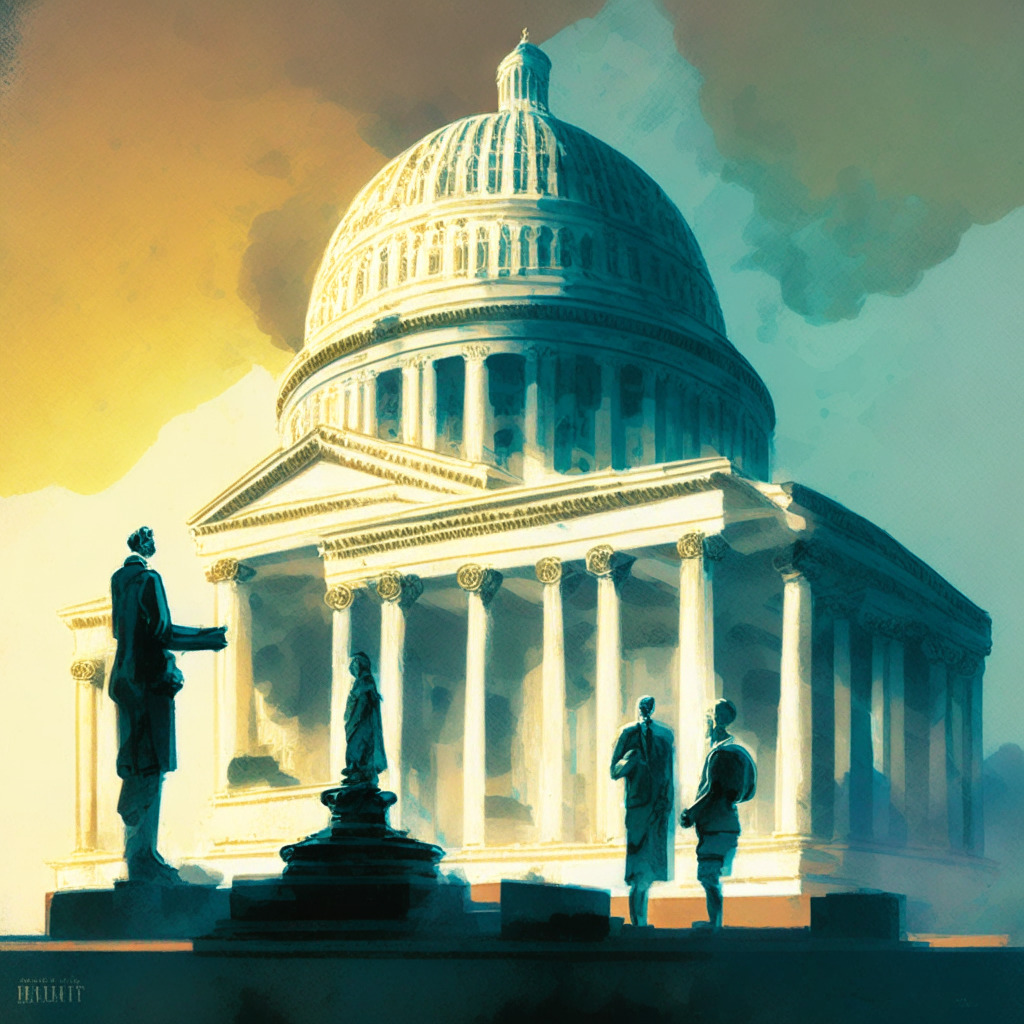“Crypto enthusiasts are celebrating progress toward a new U.S. oversight system for digital assets despite uncertainties. The development involves digital assets legislation addressing regulation framework, stablecoins, and crypto-related money laundering. The law guiding crypto operations leaped over two House committees, indicating progress in U.S. crypto regulation.”
Search Results for: Commodity Futures Trading Commission
Sweeping U.S. Regulatory Acts: Crypto Advancement or Investor Risk?
The House Financial Services Committee approves a bipartisan bill, Financial Innovation and Technology for the 21st Century Act, aiming to provide regulatory clarity for cryptocurrencies. The Act delineates registration requirements for crypto firms and seeks to define if a cryptocurrency is a security or a commodity, extending the CFTC’s control over the crypto industry.
Legal Clash in US Crypto Regulations: Republicans and Democrats Weigh In
The House Financial Services Committee advances two crypto-related bills aimed to address blockchain-related dilemmas and establish a solid legal framework. Despite opposition, proponents claim these bills will prevent the U.S.’s lag in crypto regulation and provide clarity within the digital asset industry. However, skeptics express concern over potential diminished investor protection and misuse of power imbalance.
Unraveling the Tennessee Crypto Scam: Investor Security, Regulations and the Price of Greed
A couple, Michael and Amanda Griffis, were found to have deceived more than 100 individuals in a fraudulent crypto investment scheme, amassing over $6 million. They failed to register their scheme with the CFTC, leading to legal issues and the loss of funds for their investors. This incident highlights the necessity for regulatory scrutiny and investor education in the high-stakes crypto market.
Crypto Regulation in the US: Balancing Innovation and Consumer Protection
“The US House Financial Services Committee is examining legislation for regulatory clarity in the crypto and blockchain space, including the Financial Innovation and Technology for the 21st Century Act. Critics are concerned about potential favoritism towards cryptocurrency firms over consumers and the possibility of mishandling customer funds. Regardless of outcome, there’s widespread acknowledgment of the urgent need for comprehensive cryptocurrency regulation.”
Cracking the Crypto Conundrum: Balancing Decentralization and Regulation Safeguards
The CFTC has charged a Tennessee couple for defrauding investors through a crypto investment scheme, collecting $6 million in six months. The case underlines the importance of stricter regulations in the crypto sector to protect investors and maintain system integrity.
Crypto’s Legal Labyrinth: Analyzing Recent Litigations, Regulations and Their Impact on the Industry
The cryptocurrency community has been hit by various legal and regulatory changes recently, surrounding issues like fraudulent activities, securities violations, and money laundering investigations. These developments demonstrate the dynamic challenges faced when crypto technology interacts with traditional financial structures. For a robust future, it’s crucial that the pace of regulations matches the innovation in this field.
Worldcoin Token Launch: Exciting Exchange Phenomenon or Potential Market Pitfall?
The Worldcoin token, launched by OpenAI creator Sam Altman, raised market concerns due to its tokenomics. Trading volume exceeded its capitalization by 1.6 times in just 24 hours, attributed to the project loaning massive numbers of tokens to market makers. Additionally, 40% of these tokens will be unlocked between 2024 and 2025, raising concerns about price stagnation and depreciation for potential investors, alongside possibly counterintuitive Bitcoin trends.
Japan’s Web3 Vision and Crypto-Pioneering Ambitions amid Global Exchange Controversies
“Japan’s PM Fumio Kishida supports Web3 innovation and hints at Binance commencing its operations in Japan by August 2023, presenting numerous opportunities for investors. Despite legal issues faced in the U.S., certain cryptocurrencies like Maker, Evil Pepe Coin, GMX, Chimpzee, and Trust Wallet Token (TWT) are showing promising trends bolstered by strong fundamentals and technical findings.”
Navigating the Legal Labyrinth: A Close Look at Former Celsius CEO, Alex Mashinsky’s Legal Battle
The article discusses recent legal developments in the crypto industry, particularly the extended discovery timeline granted to former Celsius CEO, Alex Mashinsky, facing several fraud charges. The article emphasizes the importance of regulatory adherence and transparency in the growing cryptocurrency sector.
Balancing Act: How Future Cryptocurrency Regulation Is Spurring Debate and Discord
“Cryptocurrencies are reshaping the global financial landscape. The International Monetary Fund (IMF) is facing challenges as it attempts to regulate them at an international level. Its vision includes competition, legal tender status, integration, and taxation – provoking varying responses and criticism. Despite this, there is increased optimism about the future of cryptocurrency regulation.”
Legal Battle Heats Up: Unraveling the Binance, CZ, and SEC Conflict
The CFTC filed a complaint against Binance, accusing it of violating laws by offering unregistered crypto derivatives in the US. The SEC has also brought charges against Binance and its founder for flagrant disregard of federal securities laws.
Binance Battles US Regulatory Allegations: Analysis of the Crypto Regulatory Tug-of-war
“The CFTC alleges that Binance engaged in illicit trading for U.S. customers since 2019, without proper registration. Yet, Binance is striving to dismiss the complaint, reflecting a sentiment that regulatory bodies may be overly stringent with crypto markets.”
Riding the Worldcoin Wave: Altman’s Project Ruffles Crypto Feathers and Fuels Regulatory Discourse
“The ‘privacy-preserving digital identity (World ID)’ project, with its native token, Worldcoin (WLD), has gained attention in the crypto sector. Notwithstanding skepticism on its circulating supply versus cap, the token’s listing on major crypto exchanges has led to a notable uptick. In the backdrop, regulatory initiatives continue to influence crypto markets.”
Navigating the Pros and Cons of the U.S. House Republicans’ New Crypto Oversight Bill
“The Financial Innovation and Technology for the 21st Century Act by U.S. House Republicans aims to provide a sound regulatory framework for crypto investors protection. The bill seeks to establish clear regulatory principles balancing progressive tech with protective legislation, which, if successful, may streamline the fragmented regulation landscape in the U.S. and serve as a global blueprint.”
Nasdaq Abandons Crypto Custody Plans: A Muddle or Tipping Point for Industry?
“Nasdaq, the tech-centric US stock exchange, has halted its plans to introduce a cryptocurrency custody service, raising concerns within the crypto industry. This comes despite BlackRock’s proposal brought hope for deep institutional interest in Bitcoin and cryptocurrencies. If the regulatory status continues, it may herald a bleak future for the industry.”
Nasdaq Pulls the Plug on Crypto Custody Service: Regulatory Challenges or a Missed Opportunity?
“Nasdaq has terminated plans to launch a cryptocurrency custody service due to recent regulatory challenges. Despite the setback, CEO Adena Friedman confirms Nasdaq will continue supporting advancements in the digital asset ecosystem. This highlights broader tension within the financial industry around cryptocurrency regulations.”
US Congress Critics Challenge SEC’s Approach to Crypto Regulation
“US representatives French Hill and Dusty Johnson question SEC chairman Gary Gensler’s approach to digital asset regulation. They suggest that shaping legislation is a more potent tool for resolving regulatory issues in the digital asset space, offering firms guidance and bolstering customer protection.”
Unraveling the Celsius Bankruptcy: A $25 Million Stakeholders’ Settlement Drama in Crypto Realm
Amidst cryptocurrency lender Celsius’ bankruptcy proceedings, a settlement plan has found an agreement to distribute $25 million from the sale of self-custody platform GK8 to Galaxy Digital among the lender, creditors, and Series B holders. Despite dissent among stakeholders, the majority plans to distribute $1 million among preferred shareholders.
Celsius’s Corporate Saga: Liquidation, Bankruptcy, and Fraud – A Glimpse into Crypto’s Legal Challenges
Facing insolvency, crypto-lender Celsius is liquidating $25 million in altcoins following U.S. court approval. As part of a settlement plan, these assets will be converted into Bitcoin and Ethereum. Amidst controversy, the firm also moved $70 million from one wallet to another, raising questions about their handling of assets and strategic maneuvering.
The Rise and Fall of Celsius Network: A Tale of Regulatory Oversight in Cryptocurrency
“The downfall of Celsius Network, a lending platform founded by Alex Mashinsky, highlights the challenges blockchain and regulatory concerns pose to the crypto industry. Misleading statements, market instability, halted withdrawals, and eventual bankruptcy underline the importance of due diligence and ongoing regulatory oversight in the cryptocurrency ecosystem.”
Ripple’s Partial Victory vs SEC: Impact on XRP and Future of Crypto Regulations
Crypto firm Ripple Labs had a partial victory against the U.S. Securities and Exchange Commission (SEC) shaping the crypto regulatory environment. The court ruled Ripple’s XRP token exchange isn’t an investment contract, but the sales to institutions violated federal securities laws.
Crypto Regulation Spotlight: Mashinsky’s Detainment Fuels Debate on SEC Oversight and CFTC Role
Alex Mashinsky’s detainment on allegations of wire fraud, securities fraud, and price manipulation intensifies discussions on crypto regulation. Mashinsky’s case, alongside a ruling favoring Ripple, could have significant implications for platforms like Binance, Coinbase, and Bittrex that have faced SEC accusations. The situation underscores the need for a comprehensive regulatory regime to counter potential frauds in the crypto market.
Crypto Horror Story: The Titanic Fall of Celsius Network and What it Means for Blockchain Banking
“Former CEO of Celsius Network, Alex Mashinsky, is facing legal charges for fraud, misleading investors, and violations of financial regulations. Allegations highlight the risks of combining traditional financial models with blockchain technology. Dissolving after dangerous financial tactics, the coerced $4.7 billion FTC settlement was rejected by Celsius’s executives, leading to bankruptcy.”
Celsius Network Fallout: Legal Woes, Misleading Practices, and a Defiant CEO
Former CEO of crypto powerhouse, Celsius Network Ltd., Alex Mashinsky, faces legal difficulties led by the U.S. Department of Justice, SEC, CFTC, and FTC. Multiple accusations include fraudulent representation of company’s financial health, market value and vested interest and concealing losses from clients.
Celsius Network: A Fall from Grace and The Future of Crypto-Regulation
“The former CEO of Celsius Network, now facing an SEC lawsuit, remains optimistic amidst legal action and the company’s voluntary Chapter 11 proceedings. With growing scrutiny on crypto-businesses, these events spark discussions on the role, relevance of regulations, and security in the crypto-space.”
Supreme Court Ruling on Student Debt Sparks a Legal Battle in the Cryptosphere
Coinbase is facing charges from the SEC, which the crypto heavyweight claims is an attempt to extend control over the $1 trillion digital asset industry. Using a recent Supreme Court ruling, which underlined that government agencies need explicit legislative backing for major decisions, Coinbase argues the SEC doesn’t have the power it’s trying to assert.
Navigating the Current Blockades: The Ups and Downs of Bitcoin’s Struggle against Regulatory Barriers
“Former CFTC Chair, Tim Massad, calls for basic market and investor protection standards for crypto commodities. Bitcoin’s value is influenced by several factors including demand, regulatory decisions, and economic conditions. Despite a recent dip, research suggests a potential surge to $120,000 by 2024.”
Exploring the Impact of the Responsible Financial Innovation Act on Cryptocurrency Future
US Senators Cynthia Lummis and Kirsten Gillibrand plan to reintroduce the Responsible Financial Innovation Act, a regulatory bill for digital assets. The legislation aims to define the SEC and CFTC roles in regulating digital assets and enhance consumer protection, potentially safeguarding against future market crashes. However, there are fears that this could suppress innovation in the sector.
Examining Self-Regulation in Crypto: Former CFTC Chair’s Constructive Approach
Former CFTC chairman, Timothy Massad, suggests developing new standards for crypto enterprises, due to existing regulations proving inadequate. His proposed solution involves creating a self-regulatory organization for crypto businesses, in collaboration with the CFTC and SEC, focusing on fraud prevention, asset protection and reporting requirements for crypto exchanges and trading platforms.
Navigating Cryptocurrency Regulation: Upcoming Legislative Proposal by US Senators Lummis and Gillibrand
US Senators Cynthia Lummis and Kirsten Gillibrand are to propose a new legislation known as the ‘Responsible Financial Innovation Act’, aimed at regulating cryptocurrencies and digital assets. The bill plans to classify most cryptocurrencies as commodities and enforce crypto exchanges to store consumer assets in third-party trusts, enhancing security. Critics argue it may also create unintended consequences.
Binance Exodus & Legal Battles: Examining Crypto Exchange Under Fire
“Amid a tightening regulatory environment, key figures from Binance have stepped down, escalating concerns over the crypto exchange’s compliance. Accusations against Binance include deceptive practices, money laundering, and sanctions violations, with lawsuits already in motion. These challenges underscore the importance of robust regulatory compliance in the crypto industry.”































